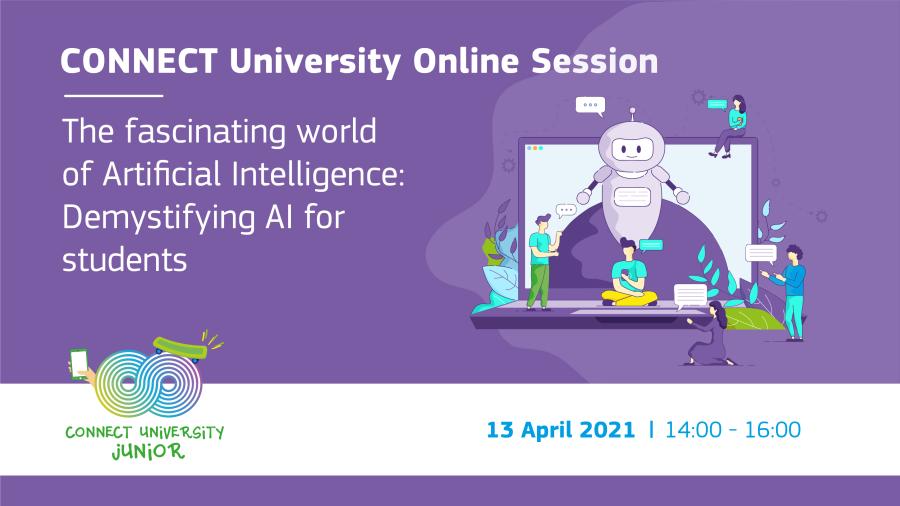Artificial Intelligence (AI) is already part of our everyday life and increasingly becomes more integrated. The distinctive characteristic of AI technology is its ability to learn and act. Thanks to AI tools, Europeans enjoy a better quality of life, whether this comes from an improved health system, self-parking cars, a clever watch and more. The rapid progress and wide use of AI technology makes it imperative that everyone and especially younger generations stay educated and aware. From virtual assistance to daily recommendations received on various online platforms, artificial intelligence and machine learning play a crucial role for today’s generation. Early education on AI comes with many great benefits. It prepares students for a strong presence in the job market, boosts creativity and problem solving skills, and sets them on a path geared towards positive societal change.
CONNECT University is committed to equipping the young generation with the awareness and skills necessary for the digital age. During this event a panel of experts shared the fundamental concepts of AI and its impact in multiple sectors. Listen to the recording and learn about the endless possibilities of AI tech, from the people that are shaping AI today!
Read more about CONNECT University Junior.

Speakers
- Martin Ulbrich, Senior Policy Officer, Artificial Intelligence Policy Development and Coordination, DG CONNECT, European Commission
Title of the presentation:The European approach to AI
An economist by training, Martin has been working on digital issues for more than twenty years in the Commission from different angles. He has joined the AI policy team in 2018, contributing to the drafting of the White Paper on AI and working on the AI Regulatory Framework. Before joining the AI unit in 2018 he had worked most recently on the impact of digitisation on the labour market, and before that on geoblocking and on the economics of networks.
Mr. Ulbrich has previously worked among others in the European Commission’s Joint Research Center, where he analysed ICT research across the EU, as well as in its industrial policy and transport departments.
- Aleksandra Przegalinska, Vice-Rector and Associate Professor at Kozminski University and the Leader of AI in Management Program, former MIT Research Fellow, AI expert and world-class keynote speaker
Title of the presentation: Artificial Intelligence - exciting opportunities and challenges ahead of us
Prof. Aleksandra Przegalinska - currently Vice-Rector and Associate Professor at Kozminski University and the Leader of AI in Management Program. Until recently, she conducted research at the Center for Collective Intelligence at the Massachusetts Institute of Technology in Boston. She graduated from The New School for Social Research in New York. In the fall 2020 started short Senior Research Fellowship in the American Institute for Economic Research. Interested in the development of new technologies, natural language processing, humanoid artificial intelligence, social robots and wearable technologies. She is the author of Collaborative Society (The MIT Press) http://www.collaborativesociety.net/, published together with Professor Dariusz Jemielniak.
- Hugues Bersini, Professor of Computer Science , Université Libre de Bruxelles
Title of the presentation: the two AIs: Conscious and subconscious
Hugues Bersini is born the 19/1/61 and is living in Brussels. He has an MS degree (1983) and a Ph.D in engineering (1989) both from Université Libre de Bruxelles (ULB). After having been supported as a researcher by a EEC grant from the JRC-CEE in Ispra (1984-1987), he became member of the IRIDIA laboratory (the AI laboratory of ULB). He is now heading this same lab with Marco Dorigo. Since 1992, he has an assistant professor position at ULB and has now become full professor, teaching computer science, Web technology, business intelligence, programming and AI. He has been partner of various industrial projects and EEC esprit projects involving the use of adaptive fuzzy or neuro controllers, optimisation algorithms and data mining. Over the last 20 years, he has published about 300 papers on his research work which covers the domains of cognitive sciences, AI for process control, connectionism, fuzzy control, lazy learning for modelling and control, reinforcement learning, biological networks, the use of neural nets for medical applications, frustration in complex systems, chaos, computational chemistry, object-oriented technologies, immune engineering and epistemology. He is quite often asked for giving tutorials covering the use of neural networks, object orientation and the behaviour of complex systems. He is a pionneer in the exploitation of biological metaphors (such as the immune system) for engineering and cognitive sciences. He co-organised at ULB the second conference on Parallel Problem Solving Nature (PPSN), the second European Conference on Artificial Life (ECAL). He co-organised the three European Workshops on Reinforcement Learning.
- Conectați-vă pentru a adăuga observații
- Etichete
- Artificial Intelligence

